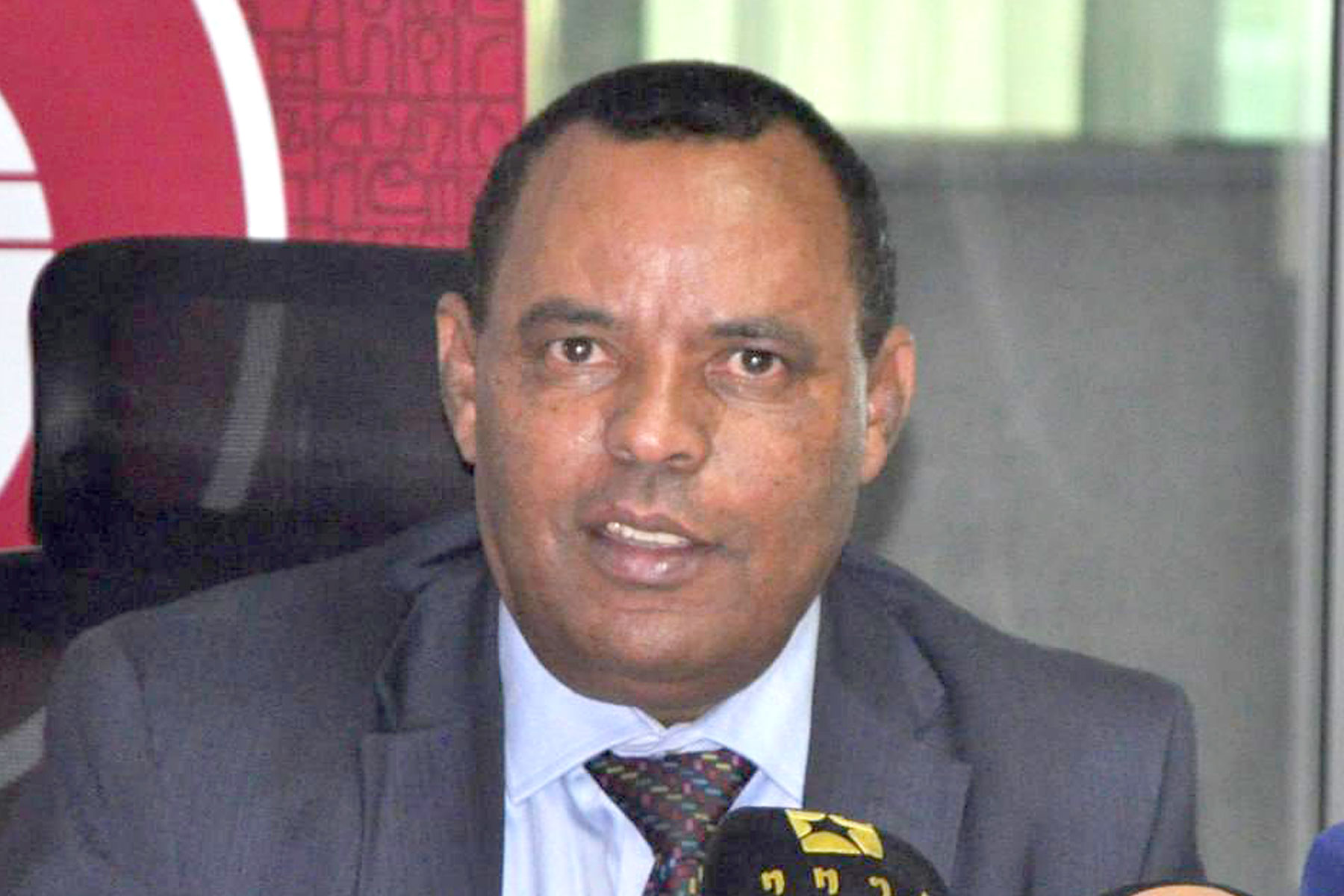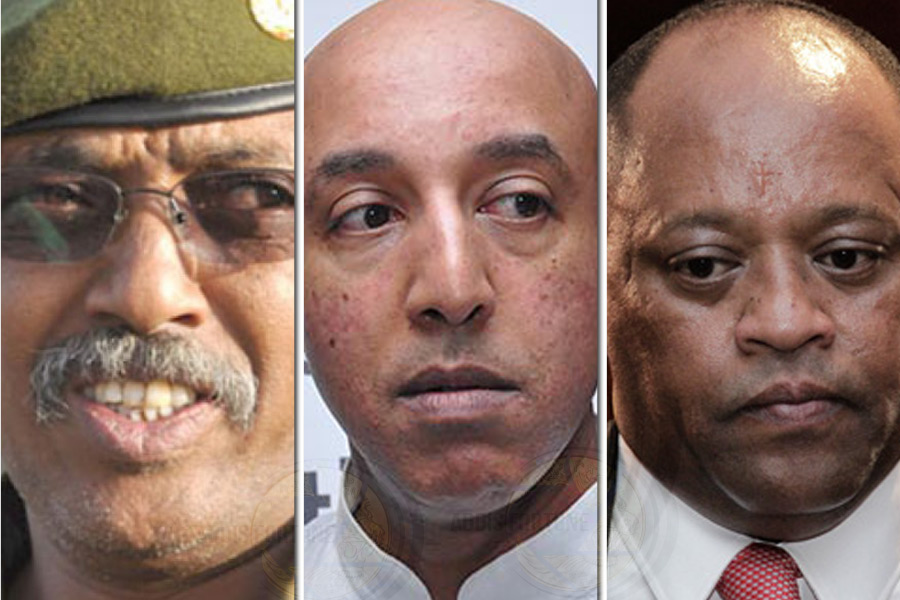
Fortune News | Jun 03,2023
Feb 20 , 2021
By Yohannes Woldegebriel
Many corruption charges filed against suspected public servants and by individuals against public offices often lack clarity, fail to mention squarely the violation or breaches committed and do not reveal specific personal gains obtained, writes Yohannes Woldegebraiel, a former public prosecutor at multiple public offices. This was what became obvious with the Office of the Attorney General's recent decision to exclude the former legal department head of the Finance Ministry from a corruption prosecution over a textbook procurement saga, he argues.
The Office of the Attorney General recently withdrew a charge filed against Bochu Sintayehu, former legal head of the Ministry of Finance. The swift withdrawal decision issued by the Office on his case, only days after he appeared at court and before he could answer to the allegations on the charge, signalled an action that involved profound legal and constitutional ramifications. This is especially true as he was given an isolated decision.
Withdrawal of a charge is ordinarily within the authority of all prosecutors. Exercised in good faith it offers a respite for the prosecution to build up a strong case, such as if there was a rush in preparing and filing a defective and unsubstantiated charge. It could also help the prosecution to dispense more accurately if it discovers that the investigation and the charge were inappropriate, untrue, or not in line with applicable laws and pieces of evidence.
There are as well situations when the withdrawal of a charge could be easily abused for self-serving or narrow partisan purposes. Any such action, therefore, it is believed, must be subject to review by prosecutors at the higher level.
This being the case, the withdrawal of a charge filed on Bochu Sintayehu should not have come as a surprise. Neither was it, in my view, worthy of front page news in this publication, headlined, "Attorney General Drops Charge against Finance Ministry Official,[Vol. 21, No. 1085, February 14, 2021]." With 11 other defendants, Bochu was charged for allegedly reversing a decision to include a bidder on a World Bank procurement of textbooks for the Education Ministry.
Admittedly, gone are the days when a prosecutor can use such power as a matter of conventional prosecutorial activity. It is possible, however, to speculate that the reconsideration of Bochu’s charge appears to be triggered by the Ministry of Finance, where he used to work. It is highly unlikely that the case could be taken up and tabled for a discussion by the Office of Attorney General on its own initiative as it has already decided to charge. Neither could it have been the Ministry of Education, who asked the police to conduct the probe and carried out the investigation in its internal audit.
By whomever it might be initiated, the withdrawal of Bochu’s charge is praiseworthy. Although the Attorney General did not issue an official apology for charging him, this helps him obtain early release before he experienced several weeks or even months of ordeals by the prosecution.
The case is baffling on a number of levels. As explained in the front page article, among other documents, the Attorney General did give a legal opinion that was used in Bochu’s letter to the Ministry of Education. The legal opinion endorsed that “the World Bank’s procurement law always prevails over all of the procurement processes it funds” as affirmed by Fikadu Tsega, deputy attorney general. This is true, as sanctioned under an article in the 2009 public procurement proclamation.
Bochu’s letter states that the procurement for the printing and distribution of English textbooks for grades one to eight and teachers' guides under the General Education Quality Improvement Project II (GEQIP Program)was conducted in accordance with World Bank guidelines. The confirmation by the Deputy Attorney General of this opinion as to the applicable law for the procurement of the bid in question should have done away with all confusion and uncertainties. It should have nullified the supposed criminal acts and irregularities of the accused.
With its endorsement of Bochu’s letter, the office of the Attorney General also accepted the enforcement of International Development Association Financing agreement for funding the Education Quality programme and the financing agreement signed between the World Bank and the Ethiopian Government on December 5, 2013. These became governing laws along with all prior “approval,” “review,” and “written concurrences,” issued by the Bank at each phase of the bid up to contract signing.
However, the amended charge filed by the Attorney General and dropped for Bochu remained valid and appropriate to resume for the remaining co-defendants within the joinder charge.
This decision is baffling and conflicting with the position of the Office and the statement offered to this publication by the Deputy Attorney General. Even if Bochu is excluded from prosecution, the amended charge does not mention anywhere the relevant guidelines and laws of the World Bank’s procurement laws. On the contrary, several provisions of the local procurement directive are repeatedly cited to have been violated, despite the fact that these are irrelevant for the bid in question. Above all, the local procurement directive mentioned is also incapable of creating any criminal liability.
The internal audit report of the Ministry of Education, which has been heavily relied on by the prosecutor to frame its amended charge, almost verbatim, was prepared exclusively with reference to the local procurement laws and directives, although these are no longer applicable. Now that Bochu has been singled-out and rightly exonerated from prosecution, the fate of other co-defendants, facing similar charges, has become undetermined and precarious.
Why was the withdrawal confined to Bochu?
Deputy Attorney General Fikadu replied that “his Office could not establish that Bochu was reaping personal benefits from his involvement in the case.”
This implies that his Office found incriminating evidence of personal gain from the remaining co-defendants. However, nowhere in the charge is a statement of personal benefits asserted on any accused apart from alleged damage sustained by government. Neither is there evidence attached on an acquisition of personal gain, whether in kind or quantified monetary value, by any of the co-defendants involved from bid document preparation to bid recommendation and contract signing.
A reading of each and every phrase and sentence in Bochu’s letter reveals that it is in fact more than authorisation to sign the contract. It endorses the entire procedures of the bid to be in line with World Bank laws and advises to proceed with the signing. The statements written in this letter also unequivocally validate all legal acts conducted to be in line with the World Bank’s procurement guidelines. These involved bid document preparation, bid evaluation, bidders’ selection, contract award, contract signing as well as the numerous “prior reviews,” “no objections,” and “concurrences” issued at different times and phases of the bid. This included the reply by the World Bank to a complaint filed to it by the rejected bidder.
On the other hand, Bochu’s letter, though declared illegal on its finding by the Ministry of Education’s internal audit report, is held to be valid by the Deputy Attorney General’s statement to this publication. In this extraordinary charge of great interest, failure to fill and complete “bid validity date” on the bid document by the rejected bidder, Burda Druck India PVT LTD, is assumed to be by the local complaint hearing board of the Public Procurement & Property Disposal Agency of “minimal effect.” The board instructed the Ministry of Education to conduct the bid evaluation again by including the rejected bidder.
This instruction is clearly a violation of the applicable laws, rules and decisions of the World Bank that has made a prior review and determined that failure to complete the bid validity date is a “major deviation” that resulted in the rejection of the bidder at the pre-screening stage of the bid evaluation.
Awkwardly, the Ministry of Education wrote in its letter pleading to the World Bank to harmonise the enforcement of the instruction of the board. It justifiably led the Bank to threaten in its reply to both the ministries of Finance and Education that it has no other alternative than declare “misprocurement” unless the contract is signed with successful bidders.
Notwithstanding this firm position maintained by the World Bank, the issue is still contentious and is yet to be proved or disproved by the prosecution and the accused during the upcoming court trial.
Interestingly, Bochu wrote the letter on behalf of the Ministry of Finance, to the Ministry of Education to escape a declaration of misprocurement. His act is deemed by the Ministry of Education’s internal auditors on their report to have been conducted without legal authority and able to be held liable and charged for nullifying the decision of the board. No matter that, ultimately, the Attorney General has concurred to be correct and in accordance with the World Bank laws and decisions.
This case is not unique. Many corruption charges filed on suspected public servants and individuals against public offices often lack clarity, fail to mention squarely the violation or breaches committed, and do not reveal specific personal gains obtained.
This has been the case in many of the Federal Ethics & Anti-Corruption Commission prosecutors' charges in the past. Sadly, it has continued with the re-established and the current “reformed” Office of the Attorney General. Most importantly, charges that have been rejected in most jurisdictions, have become the hallmark of corruption charges that are stuffed with long pages of impertinent and irrelevant material. They are wordy, defying clear and concise criminal allegations required under the Constitution and in the mandatory rules and forms prescribed under the Ethiopian Criminal Procedure Code. The charge filed on Bochu and other co-defendants is a testimony to this.
It remains to be seen if the Office, on its own self-initiative, will allow the review of the case for the remaining co-defendants. It should ensure the constitutional equal treatment and protection of “persons accused of having participated in whatever capacity in the offence or offences even at different times” in the same joinder charge and “enforce the rule of law,” as stipulated in its establishment proclamation. But it may simply ignore the case and persist with its selective withdrawal of the charge.
The more pertinent question, perhaps, is whether the Ministry of Finance will be complacent after the release of its former employee and remain oblivious to its legal mandate for other co-defendants?
After, behind it all, is the implementation of its instruction to “… undertake all acts necessary for the utilisation of the credit … in accordance with the terms and conditions set forth in the Financing Agreement.”
PUBLISHED ON
Feb 20,2021 [ VOL
21 , NO
1086]


Fortune News | Jun 03,2023

Fineline | Apr 06,2019

Radar | Jul 13,2020

News Analysis | Apr 13,2024

Fortune News | Aug 08,2020

Fortune News | Jan 19,2019

Radar | Jun 22,2019

Fortune News | Feb 09,2019

Fortune News | Apr 17,2020

Fortune News | May 04,2019

Photo Gallery | 178660 Views | May 06,2019

Photo Gallery | 168855 Views | Apr 26,2019

Photo Gallery | 159690 Views | Oct 06,2021

My Opinion | 137093 Views | Aug 14,2021
Commentaries | Oct 25,2025

Dec 22 , 2024 . By TIZITA SHEWAFERAW
Charged with transforming colossal state-owned enterprises into modern and competitiv...

Aug 18 , 2024 . By AKSAH ITALO
Although predictable Yonas Zerihun's job in the ride-hailing service is not immune to...

Jul 28 , 2024 . By TIZITA SHEWAFERAW
Unhabitual, perhaps too many, Samuel Gebreyohannes, 38, used to occasionally enjoy a couple of beers at breakfast. However, he recently swit...

Jul 13 , 2024 . By AKSAH ITALO
Investors who rely on tractors, trucks, and field vehicles for commuting, transporting commodities, and f...

Oct 25 , 2025
The regulatory machinery is on overdrive. In only two years, no fewer than 35 new pro...

Oct 18 , 2025
The political establishment, notably the ruling party and its top brass, has become p...

Oct 11 , 2025
Ladislas Farago, a roving Associated Press (AP) correspondent, arrived in Ethiopia in...

Oct 4 , 2025
Eyob Tekalegn (PhD) had been in the Governor's chair for only weeks when, on Septembe...

Oct 25 , 2025 . By YITBAREK GETACHEW
Officials of the Addis Abeba's Education Bureau have embarked on an ambitious experim...

Oct 26 , 2025 . By YITBAREK GETACHEW
The federal government is making a landmark shift in its investment incentive regime...

Oct 29 , 2025 . By NAHOM AYELE
The National Bank of Ethiopia (NBE) is preparing to issue a directive that will funda...

Oct 26 , 2025 . By SURAFEL MULUGETA
A community of booksellers shadowing the Ethiopian National Theatre has been jolted b...